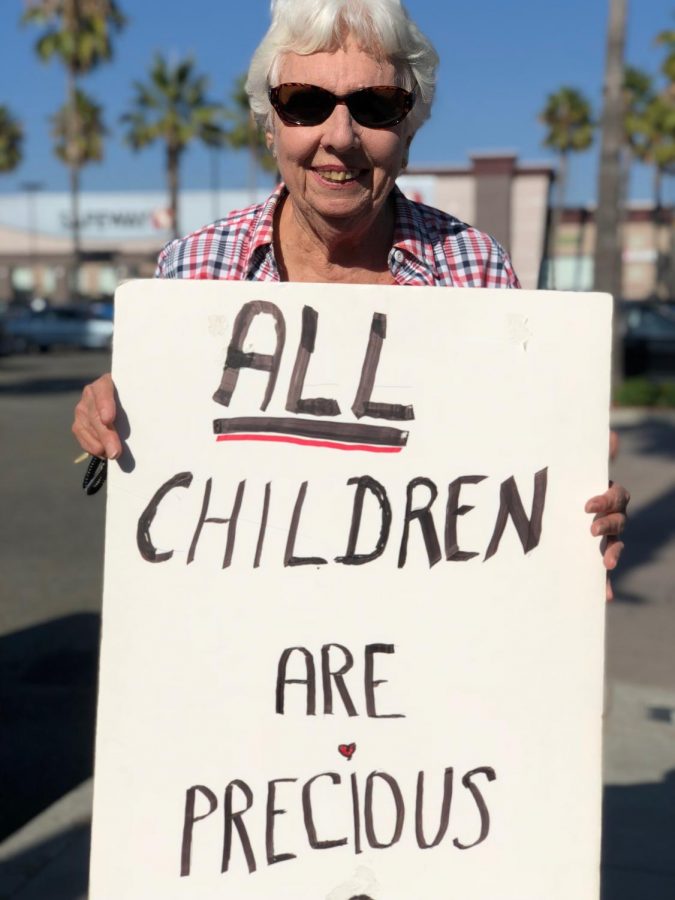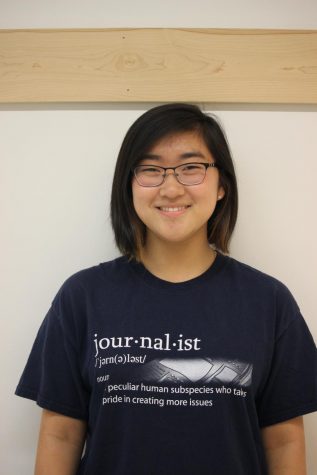In good faith: The Interfaith Council embraces coexistence
Gwen Watson, co-chairman of the Interfaith Council, holds up a sign she personalized to protest the government’s immigration directives.
January 3, 2019
In an effort to bring together the perspectives of multiple faiths, the Interfaith Council of Contra Costa County has taken on the mission of embracing peaceful coexistence between different religions and building a community whose collective voice advocates for social change.
Made up of 108 different congregations — encompassing faiths from Islam to Buddhism to Sikhism to Christianity — the Interfaith Council is a non-profit organization that built itself up from a small band of mainly Protestant churches in 1968. In 1997, the organization rebranded to become an official interfaith community, defined by welcoming “people of every faith, tradition and philosophy,” according to Executive Director Reverend Will McGarvey.
In the time during which the Interfaith Council has existed, their commitment to the unity of religious communities hasn’t wavered, but special attention has been given to engaging different perspectives religious individuals may have on current social issues. The Social Justice Alliance (SOJA), which has been part of the Interfaith Council for the past 30 years, is co-chaired by Gwen Watson and Dolores Loague and has been responsible for extensive rallying for housing for homeless families, quests to end poverty, and the Poor People’s Campaign, an effort that dates back to the time of Martin Luther King Jr. SOJA also created the successful Winter Nights program, which houses homeless families within different religious institutions for two weeks at a time during the winter.
“One of the beautiful things is, the Jewish, who do not celebrate Christmas … they take Christmas, because all the Christians are out buying Christmas trees and presents,” Watson, who has volunteered for the Interfaith Council for 25 years, said referring to the Winter Nights program. “Isn’t that something? They do Christmas! They sing Christmas carols, they put up a tree … it really shows how when you work together to help people who are really in need, you just do things that you wouldn’t normally do for other congregations. Religions tend to get along in that aspect.”
In addition to working to end poverty in the Contra Costa County, SOJA, and the Interfaith Council in general, is a platform for many individual members of the community to take a stance on an issue. For example, Joan Savarese posted her weekly rally — “Families Belong Together” — onto the Interfaith event calendar, and a significant amount of people gathered to protest the separation of children from their families on the Mexican-American border. Watson herself attended these rallies with a sign of her own, with the words “All Children Are Precious.”
Individuals are not the only people to take a stand within the organization, however. The Interfaith Council functions with an appointed board and an elected board, who gather with the intention of engaging in civil interfaith dialogue about current social issues. When deemed necessary, the Council may release a statement, bolstered by the opinions discussed in their monthly meeting, declaring their support or opposition to a particular social issue — President Trump’s immigration and refugee policies and gun violence, for instance, are topics the organization vehemently oppose. Social acceptance issues such as LGBTQ+ rights, for example, are usually supported.
This statement is posted, and sent to the 108 congregations, where the individual institutions will decide whether or not to accept and distribute the message among their own localized communities.
Although the Interfaith Council may appear to be massive organization, its individual congregations are still crucial to its advocacy.
For example, when SOJA pushed for the implementation of SB 10, a bill originally designed to eliminate the cash-bail system, the committee was able to communicate that support to the state government through a mountain of letters and phone calls, and the effort succeeded thanks to the participation of individual congregations. Often, SOJA will encourage people to write their own letters if they wish, but they also supply a letter template, which drafts a person’s support for the bill. Individual congregations will leave these, perhaps, in the lobby, so people can choose to fill it out after a service.
SOJA ended up withdrawing their support for the bill along the process however, because they believed that the amendments to the bill eliminated why they supported the bill in the first place.
SOJA has organized similar campaigns many times in the past — the committee has established a reputation of cognizance, even among politicians such as U.S. Representative Mark Desaulnier and Contra Costa County’s homeless services director Lavonna Martin.
Many more programs exist, and are being created to continue striving for the Council’s mission statement of unity and peace. McGarvey has taught many classes part of the Council’s Defusing Hatred program, where people can learn how to use “nonviolent communication skills and interfaith skills to talk to people of different cosmologies, and how to interrupt harassment when you see it.” It’s been taught 31 times so far.
A new campaign called Caring Contra Costa is launching this fall, which they lovingly refer to as a “co-ompetition” where different congregations or small groups try to make the Contra Costa County a more compassionate place.
When asked about the relationship between SOJA’s religiously motivated but political actions:
“There’s political and there’s the poor, and we keep it focused on the poor … Everything we write about is based on the church’s teachings,” Watson replied.
Among the significant political and social work the Interfaith Council and its branches have done, their stances on immigration and LGBTQ+ rights are perhaps the most influential in the current political climate.
The relationship between religious and social issues has often been demonized within the media. Various religious groups across the nation have vocalized their views on these issues, often arguing the conservative side of the debate. Christian right group Creation Ministries International, for example, condemns the LGBTQ+ community as something that “ violates God’s moral standard… [and] actually harms society.” To justify the Trump administration’s policies on the separation of immigrant families at the border, Attorney General Jeff Sessions cited a passage from the New Testament.
But Reverend McGarvey warns against focusing on the ardent, but few, religious voices that oppose social change.
“Everyone has their own relationship with their traditions, their own definition of different terms, [and] their own connection to some parts of the theology,” Rev. McGarvey said. “[But] we’re able to collect the wisdom of different religious traditions, and speak from the best places of them, rather than the minority voices that are trying to use religion to divide and conquer.”


